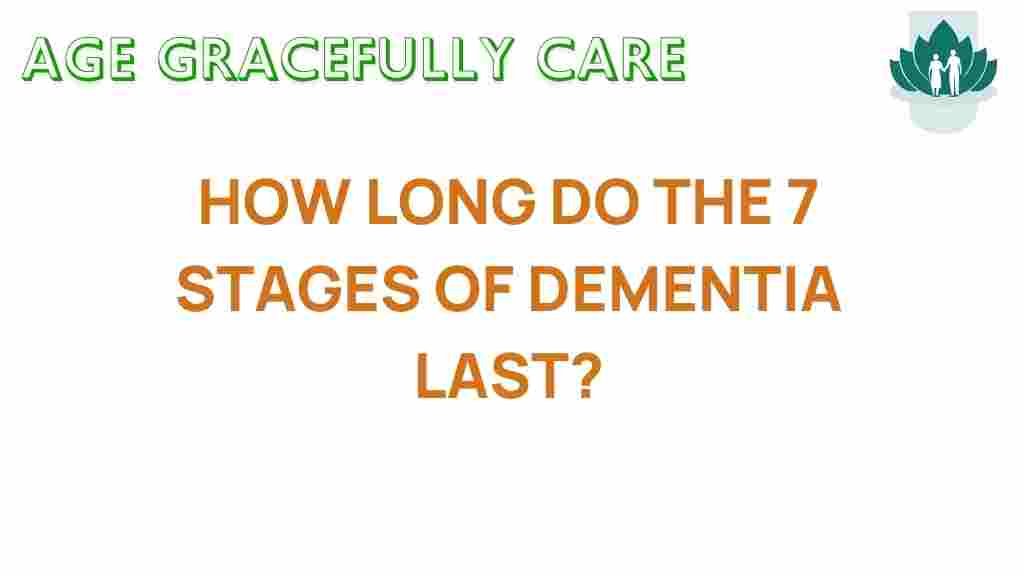Unraveling the Timeline: How Long Do the 7 Stages of Dementia Last?
Dementia is a broad term used to describe a decline in cognitive function that interferes with daily living. It is often associated with aging, but it is not a natural part of growing old. Understanding the stages of dementia and their timelines can help caregivers and families prepare for the challenges ahead. This article will explore the seven stages of dementia, focusing on how long each stage typically lasts, the symptoms involved, and the importance of care during this process.
Understanding Dementia and Its Impact
Dementia encompasses a variety of conditions that lead to cognitive decline, including memory loss, impaired reasoning, and difficulties with language. Alzheimer’s disease is the most common form of dementia, accounting for 60-80% of cases. Other types include vascular dementia, Lewy body dementia, and frontotemporal dementia.
As the population ages, dementia has become a significant public health issue. According to the World Health Organization, approximately 55 million people worldwide live with dementia, and this number is expected to increase to 78 million by 2030.
The 7 Stages of Dementia: A Comprehensive Overview
The progression of dementia is generally divided into seven stages, each marked by specific symptoms and changes in cognitive function. Understanding the timeline of these stages can help families and caregivers provide the necessary support.
Stage 1: No Cognitive Decline
In this initial stage, the individual shows no signs of cognitive decline. They may experience normal age-related changes but do not exhibit any symptoms of dementia. This stage can last anywhere from a few years to an indefinite period.
Stage 2: Very Mild Cognitive Decline
People in this stage may begin to forget familiar words or the location of everyday objects. This stage is often overlooked or dismissed as normal aging. The duration of this stage can vary but typically lasts around 2-3 years.
Stage 3: Mild Cognitive Decline
At this stage, cognitive decline becomes more noticeable. Symptoms may include:
- Difficulty concentrating
- Increased forgetfulness
- Struggles with planning or organizing
This stage usually lasts about 2-4 years. Family members may start to notice changes, prompting discussions about health and care options.
Stage 4: Moderate Cognitive Decline
This stage often involves significant memory loss, particularly regarding personal history. Individuals may have difficulty performing complex tasks and may require assistance with finances, medication, and cooking. The duration of this stage is typically around 2 years.
Stage 5: Moderately Severe Cognitive Decline
During this stage, individuals may lose the ability to perform simple tasks and may become confused about time and place. They may not remember important details about their lives, such as their address or phone number. This stage can last about 1-2 years.
Stage 6: Severe Cognitive Decline
Individuals in this stage may lose the ability to communicate coherently and may require assistance with daily activities. Behavioral changes, such as agitation or wandering, may occur. This stage often lasts around 2-3 years.
Stage 7: Very Severe Cognitive Decline
The final stage of dementia involves a complete loss of the ability to respond to the environment. Individuals may become bed-bound and require full-time care. This stage can last from a few weeks to several years, depending on overall health and the presence of other medical conditions.
Factors Influencing the Timeline of Dementia
The duration of each stage of dementia can vary widely among individuals based on several factors:
- Type of Dementia: Different types of dementia progress at different rates. For example, Alzheimer’s disease often has a longer duration compared to other forms.
- Age: Older adults may experience a more rapid decline in cognitive function compared to younger individuals.
- Overall Health: Coexisting health conditions, such as cardiovascular disease or diabetes, can influence the progression of dementia.
- Care and Support: Access to quality care and support can positively impact the quality of life and potentially slow the progression of symptoms.
The Importance of Early Diagnosis and Care
Recognizing the signs of dementia early can lead to timely interventions. Early diagnosis allows for better planning, access to resources, and a more informed approach to care. Here are some key benefits of early diagnosis:
- Access to Treatment: While there is no cure for dementia, early diagnosis can enable patients to access treatments that may slow progress.
- Planning for the Future: Families can make informed decisions regarding care, legal, and financial matters.
- Support Services: Early diagnosis connects individuals and families to support services that can enhance quality of life.
Tips for Caregivers
Caring for someone with dementia can be challenging, but there are strategies that can help caregivers navigate the journey:
- Stay Informed: Educate yourself about dementia and its stages. Knowledge can empower you to make informed decisions.
- Establish Routines: Consistent routines can provide comfort and stability for individuals with dementia.
- Encourage Independence: Allow individuals to perform tasks they can manage to promote a sense of autonomy.
- Practice Patience: Cognitive decline can lead to frustration. Approach situations with empathy and patience.
- Seek Support: Join a caregiver support group to connect with others facing similar challenges.
Conclusion
Dementia is a complex condition that affects millions of individuals and their families worldwide. Understanding the stages of dementia, their timelines, and the importance of care can empower families to navigate this challenging journey. Early diagnosis and proactive caregiving can significantly enhance the quality of life for individuals experiencing cognitive decline.
For more information on dementia and caregiving resources, visit Alzheimer’s Association. If you are looking for local support services, consider reaching out to your local health department.
By staying informed and prepared, caregivers can make a positive impact on the lives of those affected by dementia, ensuring that they receive the care and support they need during each stage of this challenging condition.
This article is in the category Health and created by AgeGracefullyCare Team

1 thought on “Unraveling the Timeline: How Long Do the 7 Stages of Dementia Last?”